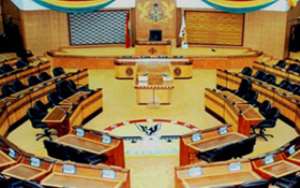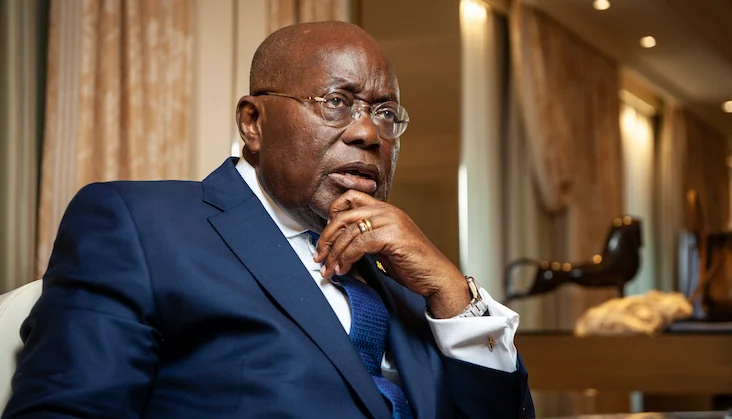
Just a couple of days ago, a big name in the political industry of Ghana made an emphatic call to increase the seats of parliament from 275 to 300 and proposed that the 25 additional seats be reserved for women (see: https://citinewsroom.com/2018/12/13/increase-parliamentary-seats-to-300-reserve-the-extra-25-for-women-haruna/). In another circle, the Chief of Staff also indicated that, the President of the republic of Ghana, H.E. Nana Akufo-Addo is keen on supporting women to become leaders (The Finder Newspaper, December 17th 2018 issue). Of course, I know certainly the President is keen on supporting women who are capable and, by merit are deserving to be leaders in making decisions that affect the development of Ghana.
I know some lawyers in the court of public opinion may be interested in debating these. But that is not the main issue in this article yet. What I am certain about is that calls and statements such as the above do not often come out of nothing, they always have genuine reasons. And in this particular case, they are reiterating the reality about the need for us to harnest the given prowess of women by virtue of their being leaders.
To whet your interest to read further, let me now give you the political context in which these calls very well fit. The Ghana Statistical Service from its 2010 population and housing census puts Ghana’s female population at 51%. That is more than a half of Ghana's population right? Yet females are underrepresented in Ghana’s legislature. In other words, the 7th parliament of the 4th republic of Ghana has only 35 females out of 275 Members of Parliament (MPs). The figure 35 represents only 12.75% of the entire Parliamentarians in Ghana. Yes, that is how minor a majority population in Ghana is in the house of parliament.
One may ask, what if it is that the females are not interested? Well, that is no longer the case in this day and age because there is enough strong evidence to show that the current number of female MPs in Ghana is not a reflection of any fact that women are not interested in politics. In fact, whereas the number of female MPs increased from 29 to 35 between 2012 and 2016, a colossal number of 137 out of the 1,158 parliamentary candidates who contested in the 2016 general elections were women (Electoral Commission, Ghana).
The question is, at this pace and proportion, when will Ghana ever hit the 50 percent mark of the 275 MPs if we were to ensure equal representation of women in parliament as there are 51% females in the country? In this regard, it can only be said that Ghana has a long way to go relative to figures from other countries in Sub-Saharan Africa. For instance, available figures show that Rwanda has about 63.80 percent parliamentary seats for women, and there are 42.70 percent and 41.80 percent parliamentary seats for women in Senegal and South Africa respectively.
Certainly, the reason that explains the difference between Ghana and the countries above in terms of female representation in parliament is not our absolute populations. In fact, except South Africa, there are lesser number of females in Senegal and in Rwanda than there are in Ghana. So, the reasons for the low representation of females in Ghana's parliament may be more complex than an ordinary thought can figure out.
In the last few political seasons, the major stumbling block of women aspirants used to be finance, as their male counterparts were more able to dole out money to electorates. However, the dynamics have become more diversified and, perhaps very intricate to easily work out. Stated differently, aside from the element of financing, women aspirants in political elections, no matter how capable they are still face the challenge of needless gender stigmatisation from the public. Therefore, until something practical and equitably feasible is done to heal the social injury women aspirants are subjected to in Ghana's political landscape, increasing the space for female representation in parliament may not be as easy as being wished.
This is where the sense comes in to have a collective support for more female representation in parliament. Moving forward, and especially in the coming parliamentary elections, leadership of all political parties in Ghana need to drum up supports for female aspirants by, at least making the internal party arrangements more convenient for them to gain victory. As to what to do exactly in this regard is a matter of home style for each party. Needless to say that we should preach for quantity at the expense of quality, or that at all cost, female aspirants must be favoured in the coming parliamentary elections. That I think should be clear.
The fact of the matter is that by virtue of their creation, women have better understanding than men do of the real issues confronting the ordinary person in Ghana. Women are more passionate in what they do, they are selfless in the interventions they take, they have better respect for value for money, and more importantly they are always steadfast in doing what they believe can grow their society. So, it cannot be doubted that when women are given an increased space and voice to be heard in parliament, but also the chance to contribute to the development of Ghana, we can have better and sustainable results.
Unfortunately, in all constituencies of Ghana, the major challenge of the female aspirant is the extent to which the mantra of "the survival of the fittest" is required to win victory first as parliamentary candidates of their parties. If all else were equal, women did not have to be worried about this mantra insofar as they are capable. Unfortunately, the world is not a very fair place to live in. So we should not pretend that we are not in the know of the harsh reality. Hence, it is imperative that those with the duty to elect the parliamentary candidates of their parties must be exceptionally encouraged and internally motivated to join the campaign to have more women in parliament thereby by exercising their franchise in favour of female aspirants.
I am not a legal luminary presently, but I do know that without any legal backing, the call to increase female representation in parliament in the long term will be a mirage. Therefore, there cannot be any better time to pass the Affirmative Action Bill than now.
I am hopeful that the passage of the Affirmative Action Bill will redress the gender imbalance in Ghana, especially as it relates to discrimination against women in political race. I am also sure that the passage of the bill will provide a more favourable system of representation in electoral politics and governance of Ghana for women.
Until the bill is passed, let's all support in our own small bits to ensure that the need to increase female representation in Parliament gains further attention in our political discourses. And it behoves especially those with the capacity of doing so to invoke their given powers.
By: Faisal Abdul Nasir Abdul Swamad
Email: [email protected]




 Mahama was a one-term president because he was incompetent and brought untold ha...
Mahama was a one-term president because he was incompetent and brought untold ha...
 Shortage of ‘bentua’ hits Accra Central Market
Shortage of ‘bentua’ hits Accra Central Market
 Blame IMF programme for Cedi's decline —Prof Bokpin
Blame IMF programme for Cedi's decline —Prof Bokpin
 Court denies Kasoa soldier killer bail
Court denies Kasoa soldier killer bail
 All crooked deals are cooked at Jubilee House – Franklin Cudjoe
All crooked deals are cooked at Jubilee House – Franklin Cudjoe
 Don’t be tricked by Mahama’s rebranding move – Richard Ahiagbah to Ghanaians
Don’t be tricked by Mahama’s rebranding move – Richard Ahiagbah to Ghanaians
 Petition against Kissi Agyebeng not surprising – Justice Srem Sai
Petition against Kissi Agyebeng not surprising – Justice Srem Sai
 Akufo-Addo’s handling of petitions against top officials disappointing – Justice...
Akufo-Addo’s handling of petitions against top officials disappointing – Justice...
 Osino: ‘Sleeping’ tipper truck driver runs into building
Osino: ‘Sleeping’ tipper truck driver runs into building
 Ahmed Suale's killers will be brought to justice no matter how long it takes - A...
Ahmed Suale's killers will be brought to justice no matter how long it takes - A...
